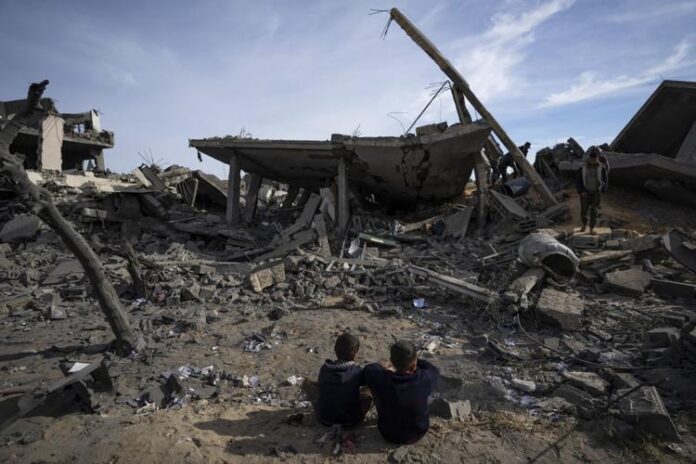Israeli forces rescued two hostages early Monday, storming a heavily guarded apartment in the Gaza Strip and extracting the captives under fire in a dramatic raid that was a small but symbolically significant success for Israel. Heavy airstrikes that provided cover for the operation killed at least 67 Palestinians, according to health officials in the beleaguered territory.
The plight of the hostages has profoundly shaken Israelis, and the rescue in densely populated Rafah briefly lifted the spirits of a nation still reeling from Hamas’ cross-border raid last year that started the war. Israel has described Rafah — a city on the southern edge of the Gaza Strip where 1.4 million Palestinians have fled fighting elsewhere — as the last remaining Hamas stronghold in the territory and signaled that its ground offensive may soon target the city.
In Gaza, the operation unleashed another tragedy in a war that has killed 28,340 Palestinians in the territory, displaced over 80% of the population and set off a massive humanitarian crisis.
More than 12,300 Palestinian minors — children and young teens — have been killed in the conflict, the Health Ministry in Hamas-run Gaza said Monday. About 8,400 women were also among those killed. That means minors make up about 43% of the dead and women and minors together they make up 73% of the dead.
The ministry, which does not distinguish between combatants and civilians, provided the breakdown at the request of The Associated Press. Israel claims to have killed about 10,000 Hamas fighters.
In Hamas’ cross-border raid on Oct. 7, an estimated 1,200 people, mostly civilians, were killed, and militants took 250 people captive, according to Israeli authorities.
Israel says about 100 hostages remain in Hamas captivity after dozens were freed during a cease-fire in November. Hamas also holds the remains of roughly 30 others who were either killed on Oct. 7 or died in captivity.
The government has made freeing the over 100 remaining hostages a top aim of its war, along with destroying Hamas’ military and governing capabilities. But as the fighting drags on, now in its fifth month, their freedom remains elusive and rifts have emerged in Israel over the best approach to end their ordeal.
Israeli Prime Minister Benjamin Netanyahu has insisted persistent military pressure will bring about the captives’ freedom — a position he repeated on Monday — even as other top officials have opposed this, saying a deal is the only way to secure their release.
A DRAMATIC RAID
Israeli military spokesman Read Adm. Daniel Hagari said special forces broke into a second-floor apartment in Rafah under fire at 1:49 a.m. Monday, accompanied a minute later by airstrikes on surrounding areas. He said the hostages were being guarded by armed Hamas militants and that members of the rescue team shielded the hostages with their bodies as a heavy battle erupted in several places at once with Hamas gunmen.
The army identified those rescued as Fernando Simon Marman, 60, and Louis Har, 70, abducted by Hamas militants from Kibbutz Nir Yitzhak on Oct. 7. Netanyahu’s office said they also hold Argentinian citizenship.
The hostages were airlifted to Sheba Medical Center in central Israel, and their condition was reported to be good. They are just the second and third hostages to be rescued safely; a female soldier was rescued in November.
The rescue, which Hagari said was based on precise intelligence and planned for some time, is a morale booster for Israelis but a small step toward winning the release of the remaining hostages, who are believed to be spread out and hidden in tunnels, likely in poor condition.
Har’s son-in-law, Idan Begerano, who saw the released captives at the hospital, said the two men were thin and pale, but communicating well and aware of their surroundings.
Begerano said Har told him immediately upon seeing him: “You have a birthday today, mazal tov.” The men, wearing sweatsuits, held long, tearful embraces with their relatives at hospital, according to video released by Netanyahu’s office.
DOZENS KILLED IN STRIKES
The airstrikes that backed up the Israeli forces hit jam-packed Rafah in the middle of the night and dozens of explosions could be heard around 2 a.m. Ashraf al-Qidra, spokesman for the Health Ministry, said at least 67 people, including women and children, were killed in the strikes.
Al-Qidra said rescuers were still searching the rubble; an Associated Press journalist counted at least 50 bodies at the Abu Youssef al-Najjar Hospital in Rafah.
Mohamed Zoghroub, a Palestinian living in Rafah, said he saw a black jeep speeding near the Shaboura refugee camp in the town followed by clashes and heavy airstrikes.
“We found ourselves running with our children, from the airstrikes, in every direction,” he said, speaking from an area flattened by the heavy strikes overnight.
Footage circulating on social media from Rafah’s Kuwaiti hospital showed dead or wounded children. The footage could not immediately be verified but was consistent with AP reporting.
A young man can be seen carrying the body of an infant who he said was killed in the attacks. He said the girl, the daughter of his neighbor, was born and killed during the war.
“Let Netanyahu come and see: Is this (infant) one of your designated targets?” he said.
CONCERNS ABOUT RAFAH
Netanyahu has said sending ground troops into Rafah is essential to meeting Israel’s war goals. On Sunday, the White House said President Joe Biden had warned Netanyahu that Israel should not conduct a military operation against Hamas in Rafah without a “credible and executable” plan to protect civilians.
More than half of Gaza’s 2.3 million population is now crammed into Rafah, where hundreds of thousands live in sprawling tent camps and overcrowded U.N. shelters.
Biden’s remarks, made in a phone call with Netanyahu, were his most forceful language yet on the possible operation.
Discussion of the potential for a cease-fire agreement took up much of the call, a senior U.S. administration official said, and after weeks of diplomacy, a “framework” is now “pretty much” in place for a deal that could see the release of remaining hostages held by Hamas in exchange for Palestinian prisoners and a halt to fighting.
The official, who spoke on condition of anonymity to discuss negotiations, acknowledged that “gaps remain,” but declined to give details. The official said military pressure on Hamas in the southern city of Khan Younis in recent weeks helped bring the group closer to accepting a deal.
Netanyahu’s office declined to comment on the call. Hamas’ Al-Aqsa television station earlier quoted an unnamed Hamas official as saying any invasion of Rafah would “blow up” the talks mediated by the United States, Egypt and Qatar.
Biden and Netanyahu spoke after two Egyptian officials and a Western diplomat said Egypt threatened to suspend its peace treaty with Israel if troops are sent into Rafah.















